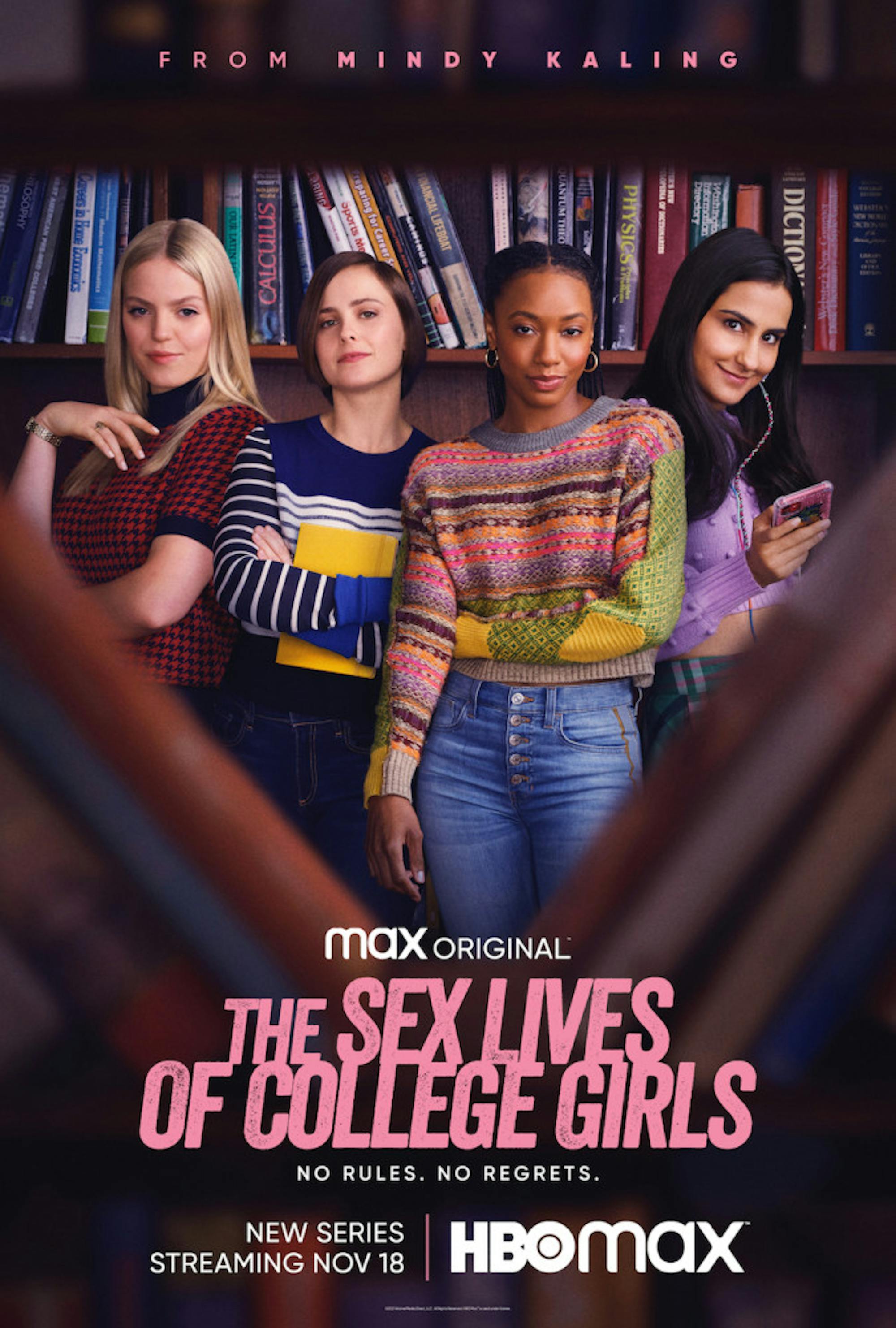Mindy Kaling seemingly holds a monopoly on the quirky youthful comedy. With the smash success of “Never Have I Ever” (2020–), Kaling reemerged onto the comedy scene and found new footing. Now she follows up with “The Sex Lives of College Girls” (2021–), an intricate but laugh-inducing tale of four roommates and their exploits. Though maintaining a similar style and tone, “The Sex Lives of College Girls” brings a more nuanced and socially prudent emphasis to Kaling’s comedy. The series is best when it does just that: use light comedy to comment on the broader traumas and fallbacks of the college experience.
The show follows four roommates, all of whom have individual storylines and struggles. There’s Leighton (Reneé Rapp), a wealthy legacy student who hides her sexuality; Whitney (Alyah Chanelle Scott), a senator’s daughter who struggles through an affair with her soccer coach; Kimberly (Pauline Chalamet), a more inexperienced student who attempts to juggle her work-study job and normal college fun; and Bela (Amrit Kaur), an aspiring comedy writer who faces trauma in her attempted pledge to the school’s famed comedy journal. This core ensemble each experiences their own trials of college life, specifically relating to sex but also moving through the dimensions of class, power and identity.
To start, a basic qualifier must be put out there. In writing about this show I have a necessarily limited perspective, being that I’m a man reviewing a show entitled “The Sex Lives of College Girls." Although the show is generally relatable and applicable to all audiences, the show has a specific message about femininity and gender experience that I am unable to comment on. Though I believe that this review can be holistic in its nature, I do recommend seeking out good femme-identifying journalism on the series.
That being said, the show is largely just plain old fun. The show follows the generalized comedy tropes of Kaling’s previous shows, almost making itself similar to a sitcom in nature. In that way the show is somewhat mindlessly intoxicating — it’ll have you chuckling, but also intrigued and wanting to push forward to the next episode. Further, the stylistic choice of following four different lives equally, and not having a singular lead, allows for the show to be quick and never long-winded. If one doesn’t like a storyline, there’s no need to worry: the plot will transition over soon enough.
The show also has some phenomenal acting talent, which must be praised. All four leads do incredible work, with all providing true nuance and dimension to their fairly one-sided characters. The show casts young budding talent, which allows it to maintain its light-heartedness as the actors' relative anonymity can help replicate the feeling of being new to college. The side characters also provide important plot building, with some of them defining the show. Special shoutouts go to Ilia Isorelýs Paulino and Christopher Meyer, who play Kimberly’s coworkers. It is the dynamic side characters that allow each of the leads’ characters to be properly fleshed out.
As featured in the title, the show makes important commentary on sex and sexuality within a college setting. The show features sex in its highs and lows, and features a significant discussion of sexual politics. This provides a more serious and topical context to the show than some of Kaling’s others. The show is comedic in nature, but is still able to effectively discuss things like sexual harassment, sex addiction and the role of age in sex. These conversations are important, and give the show immense value beyond its simple enjoyability.
Finally, it's important to engage in some of the common social media criticism of the show. Many on platforms like TikTok and Twitter believe the series shows its age, in that it is clear that it was written by an older writing team. Specifically, a clip of the show went viral on TikTok in which Bela says, “This is the dress! Fire emoji, head exploding emoji, tongue hanging out emoji”. The criticism is clear: who says emojis out loud?This misstep is reflective of a broader critique on media, being that shows meant for and written about young people are not necessarily written by those same young people. Thus, the cultural touchstones may not match up. Still, though I believe the critique to be valid for the series, the good outweighs the bad. At some point one gives up on cringing at misrepresentations of their generation, and falls into the simple plot and comedy.
All in all, “The Sex Lives of College Girls” may be one of Kaling’s most successful projects yet. While some critics argue that the show could have delved into its heavier topics even more deeply, Kaling attempts to take on pressing social issues in a way that is both light-hearted and clear in tone. The show is able to achieve both sides of the coin: be a simple funny comedy, but also address broader problems.






